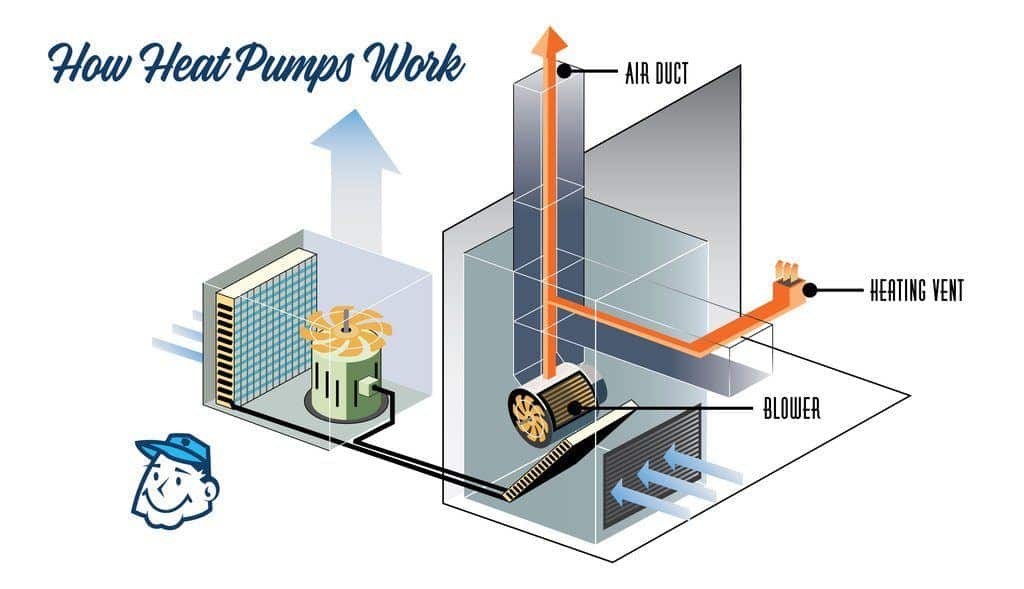
When it comes to heating and cooling your home, you have many different options. One that is becoming more common as the years go by is the heat pump. Before investing in this type of system, it’s important that you understand more about it so that you can be assured that it will work adequately for your space.
What Does a Heat Pump Do?
Heat pumps allow you to heat your home in the wintertime and cool it in the summertime. The actual name heat pump simply refers to the process of transferring heat from one place to the next. In the wintertime, a heat pump pulls heat from the air outside and brings it into your home. In the summertime, a heat pump will pull the heat from the inside of your home and displace it outside.
Do Heat Pumps Work in Any Environment?
Depending on where you live in the country, you may not have heard much about heat pumps because they’re not recommended for your climate. Heat pumps are good options for homeowners who live in mild climate regions. This is due to the fact that heat pumps are only designed to perform at temperatures typically above freezing.
You may find that some brands are rated up to -10 or 12 degrees Fahrenheit. However, they don’t go much below that. When the temperatures get too cold outside, the heat pump is unable to adequately move heat from the outside of your home to the inside. It is important to note that heat pump systems can be coupled with other types of heating systems like a furnace. This is great for homes in colder climates where a heat pump is not enough to fully warm the home when it gets too cold outside.
Are Heat Pumps Energy Efficient?
Heat pumps are extremely energy efficient, which is why they are utilized in homes in mild climate areas. To help put this into perspective, it helps to look at energy efficiency in the form of a percent. Heating system manufacturers measure energy efficiency based on the amount of energy that the system consumes versus how much heat it outputs.
When it comes to a traditional furnace, some of the best ones on the market are 95% efficient. This means that for every unit of energy consumed, this type of furnace can output 95% of that unit in the form of heat. While 95% is a fairly high amount, it is nothing compared to the ability of a heat pump. A heat pump operating under ideal conditions can produce 300% energy efficiency.
After reading through these percentages, it becomes clear why homeowners are investing in heat pump systems. Even if you have a traditional furnace, you can utilize a heat pump whenever the temperatures are above freezing. This can help to reduce your overall energy bill for the year.
What Types of Heat Pumps Are There?
There are two main types of heat pumps that homeowners can purchase. These include air source heat pumps and ground source heat pumps. The difference between the two systems is where they pull and disperse heat from the outdoors. An air-source heat pump will pull heat out of the air outside and move it inside or vice versa. A ground source heat pump will pull heat out of the ground and move it inside or vice versa.
The most common of these two is going to be the air source heat pump, as it requires fewer installation costs. Ground source heat pumps can be more energy-efficient than air source heat pumps. However, they require a lot of installation labor and parts because the ground has to be dug up to place the equipment. It’s also essential to note that not all properties are eligible for a ground source heat pump, also known as a geothermal heat pump.
What Components Do They Have?
Most people are familiar with the setup of a furnace inside of their home. However, a heat pump is a whole different system, and it’s essential to understand what components come along with it. The equipment that your home will have with a heat pump will be highly dependent on whether you have ductwork running through your home or you have a mini-split system installed.
In the event that you have existing ducting running through your home, you’re going to have two main pieces of equipment. The first is the outdoor condenser unit which will sit against your home. The second is an air handler that is responsible for moving warmed or cooled air through the ducting in your home.
If you have a mini-split system installed in your home, then there’s going to be no indoor air handler unit. Rather, you’re going to have one main heat pump unit that sits outside of your home and that is connected to all the mini-split units via small piping hidden underneath the conduit on the exterior of your home.
How Long Do Heat Pumps Last?
Heat pumps are designed to last anywhere between 10 to 20 years. On average, the ground source heat pumps will last longer. The actual lifespan of your heat pump system will highly depend on a number of different factors. These include the amount of maintenance that it gets, how often it’s run, and so forth.
Why Do Outdoor Heat Pump Units Emit Steam in the Winter?
If you currently have a heat pump that you’re using in the winter or you’ve driven by houses that have heat pumps that produce steam, it can be an alarming sight at first. However, it’s crucial to realize that heat pumps are specifically designed with a defrost mode to help them perform better in the winter months.
Whenever the outdoor coils become covered in ice, the unit will sense it and turn on the outdoor heater. This will defrost the coils over a period of 20 to 30 minutes, during which steam will be emitted from the unit. Also, during this time, you may experience a reduction of heat inside of your home.
What SEER Ratings Do Heat Pumps Have?
When it comes to measuring energy efficiency for an air conditioning system, experts utilize the SEER scale. The higher the rating, the more energy-efficient the system is. Most standard air conditioners have a SEER rating between 14 and 17. Due to the high efficiency of heat pumps, they have SEER ratings ranging from 18 to 20.5.
What HSPF Ratings Do Heat Pumps Have?
Heat pumps are also rated based on the HSPF scale. This shows how effective a heating system is compared to the amount of energy that it utilizes. Typically heat pumps will have an HSPF rating between 7.7 and 10.
Renowned Heating Services
McGowan's Heating & Air Conditioning offers renowned heating services for the entire Jacksonville, FL, area. We’d be happy to assist you with all of your AC and heating repair, installation, maintenance. We also offer indoor air quality, air duct cleaning, mini splits, attic insulation, mobile home units, HVAC design, and commercial HVAC services. Call us today to schedule your next service appointment.



